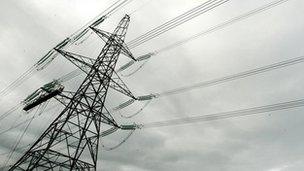The bottom line on independence
- Published

Several big firms have raised concerns about the independence referendum
Heads are beginning to appear, nervously, above the parapet. Business is engaging in the independence debate.
Others are holding back, partly because their attention is focused on getting through the downturn, but also to see what happens to those making the first move.
If you're in the business of making money, it's not seen as helpful to the top or bottom line to get caught up in constitutional politics.
And some in business have memories of getting on the wrong side of the devolution debate in the 1990s, when business leaders warned of dire consequences, even from a limited dose of home rule.
That brought them a lot of political flak and their warnings later came to nothing much.
There remains the question of whether devolution has so far been good for business and economic growth, and this week we got an answer - of which, more later.
SSE, formerly Scottish and Southern Energy and known to most of us through its Scottish Hydro brand, was a significant first mover in raising its concerns about the independence referendum, on 24 February.
It didn't personalise this by having chief executive Ian Marchant front up the company's position. Instead, it was an anonymous statement issued to the London Stock Exchange, responding to both government consultations currently under way.
As I wrote last week, this was significant because SSE is a large company based in Scotland (and intending to stay here), with its markets shaped by government and regulators. It can't be seen as outside interference.
It's also very closely aligned with the Scottish government's economic strategy. Ian Marchant is convener of the Scottish government-appointed 2020 Climate Group, and his company is vital to achieving ministers' ambitious renewable energy targets.
So if SSE is saying future investment is going to be more expensive, at least until the constitutional uncertainty is resolved, then that's an awkward message for the Scottish government to digest.
Home-grown contributions
The other business contributions to the independence in the wake of SSE have also been home-grown.
Keith Cochrane, chief executive of Weir Group, backed up the comments from SSE, though the Glasgow-based engineering company is now so diversified globally that it faces far less uncertainty than an energy utility.
Mr Cochrane also stressed that he's not planning to take his Glasgow headquarters anywhere else.
Peter Hughes at Scottish Engineering backed the same message, with a survey of his members. Four hundred were asked, 100 responded, 72 of them replied they don't like the uncertainty in the referendum delay until 2014. Keith Miller, chief executive at Miller Group, later agreed.

Power firm SSE was the first major business to engage in the independence debate
That "uncertainty" counts on two fronts.
One is that this weekend has seen it take a leading role in the independence debate, particularly from Liberal Democrats at their conference in Inverness.
Sowing seeds of doubt about independence, by warning of "uncertainty", could be one of the stronger pitches from the pro-union side.
But that's not to say these business leaders are arguing against independence. They have been careful to say only that they don't like uncertainty while Scots make their minds up. They are (so far) at pains to point out it's for voters to decide.
However, the SSE statement does go on to say that a "yes" vote would lead to further uncertainty while there are complex negotiations with the rest of the UK.
Investment calculation
That's a reminder that co-operation across the border on energy regulation - which both SSE and the Scottish government would like to see - may not go smoothly if it becomes entangled with other issues.
Business is actually spelling out something that's rather obvious: political risk is an element in any investment calculation, alongside financial and technical risk. And while the future of Scotland's governance, and therefore its tax regime, currency and access to markets, is in any doubt at all, that constitutes a risk, which carries a cost.
The SNP government has pointed out that remaining within the UK is not without its risks either.
Three big tax hikes on offshore oil and gas production in the past ten years only increase the risk of more to follow, so they represent a major political risk for that industry. That's one reason Oil and Gas UK, representing the industry, is keeping well out of the debate.
The St Andrew's House administration responded to SSE, after an unusually long pause, by welcoming the company to the debate, while asking it to reflect on its experience of having the plug pulled on carbon capture plans at Peterhead. That was under a UK government.
Also carefully stepping away from controversy in the past week was Ignacio Galan. The chairman and chief executive of Iberdrola, owner of Scottish Power, was at his Cumbernauld training centre on Tuesday, meeting Alex Salmond.
Despite initial criticism of the Spanish takeover of one of Scotland's largest firms, the two men get on particularly well. Senor Galan has plenty experience of the complexities of asymmetric, and sometimes violent, Spanish regional politics, with his headquarters in Bilbao. He knows when to avoid trouble.
Business opportunity
On the nationalist balance sheet of business support, Holyrood ministers list all those international companies that continue to invest in Scotland - in renewable energy, finance and retail - while knowing there's a referendum and the possibility of constitutional change on the way.
And they cited another apparent supporter for the independence cause this week: one Michael Donnelly, a financial analyst from Scotland, working at Cannacord Genuity in London.
No, I didn't know much about his company either, but Mr Donnelly watches Babcock, the engineering services company that is big into defence contracts at Rosyth and the Clyde's submarine complex.
It was reported that he had written an analyst's note saying Scotland's defence industry would benefit from independence, as it would provide an opportunity for companies such as Babcock.
SNP MP Mike Weir said: "This analysis shows that independence offers real opportunities for business and investment in Scotland.
"Independence is an opportunity to address the decline in Scotland's defence-industrial landscape after a decade of UK cuts which have seen the loss of thousands of direct defence and defence industry jobs."
But Mr Donnelly has been somewhat misunderstood. I've read his note and spoken to him, and it turns out that what he meant was that removal of submarines from Scotland to bases elsewhere in the UK would be a great money-making opportunity for Babcock, as it's the only company with the expertise to do the moving for the Ministry of Defence.
It's an opportunity "...given the significant contribution to employment of the Faslane and Rosyth businesses, the complexity and time involved in potentially re-locating nuclear/submarine facilities, and the unique nature of the assets that are owned by Babcock in those locations".
Spending a lot of taxpayer funds on that sort of dislocation may not be the kind of opportunity Mr Weir had in mind.
Devolution dividend
Meanwhile, a return to the question of just how much difference devolution has made so far to the state of the Scottish economy.
The answer: not much.
This comes from the Fraser of Allander Institute at Strathclyde University. Last week, it published its analysis and forecasts of the economy.
But lost amid the gloomy outlook was an academic analysis from across the city at Glasgow University, where economists at the Centre for Public Policy for Regions have been crunching numbers.
They've looked at the evidence for productivity improvements in Scotland and the other devolved nations, as well as changes to employment when compared with the rest of the UK.
They've found little evidence that devolution has helped pick up Scotland's productivity. Output per head has improved, relative to the UK, but it's not clear that the decisions at Holyrood made the difference to explain that.
For Wales and Northern Ireland, the CPPR concludes devolution has not resulted in an economic dividend, with Welsh productivity going backwards.
What the paper acknowledges is that it's unable to say what might have happened without devolution, and what decisions at a micro or company level have been affected by having at least some political decision-making closer at hand.
Perhaps the most disturbing finding of the research is how much Scottish research and development, at least by larger firms, continues to lie at or near the bottom of the UK table of nations and regions.
And the most telling observation is, for all the opportunities of devolution to Scotland, Wales and Northern Ireland, how little economic policy has diverged.